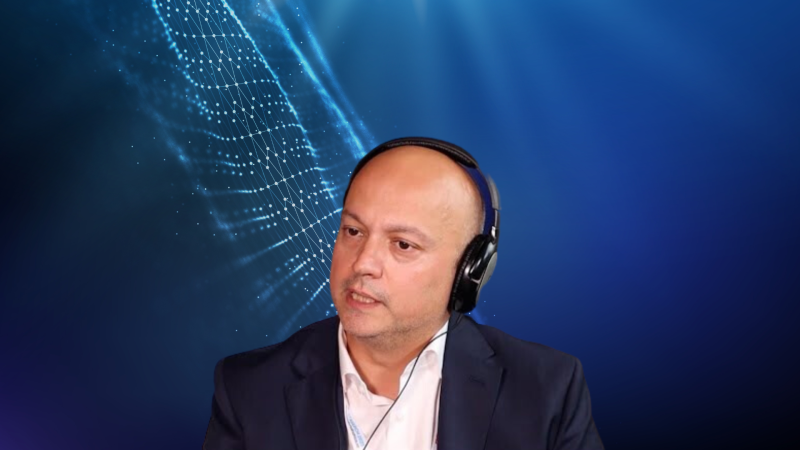CEO Of Xapo Bank, Seamus Rocca, Explains The Integration Of Traditional Banking With Crypto Finance

Categories :
Blockchain is transforming everything from payment transactions to how money is raised in the private market. Is it possible to integrate traditional banking with crypto finance? How do traditional banks embrace this technology? Dinis Guarda interviews Seamus Rocca, Director and CEO of Xapo Private Bank, the first bank in the world to fully integrate traditional private banking with crypto.
Blockchain technology has garnered significant attention over the past decade, progressing beyond the phase of hype into the mainstream conversations about banking and wealth management.
There has been a growing interest among retail banking clients and institutional investors in cryptocurrency as a financial vehicle. Powered by distributed ledger technology (DLT), such as blockchain, crypto is attracting an increasing number of investors, fintech firms, and venture capital funds, who now recognise that cryptocurrency is the future of money. These participants are also now making long-term commitments to it.
The journey of crypto: From an environment of scepticism to a fresh perspective of opportunities
Crypto has faced a very loud and public backlash. While JP Morgan Chase CEO Jamie Dimon called it "worse than tulip bulbs”, referencing the 17th-century Dutch tulip market bubble, Lloyd Blankfein, Senior Chairman of Goldman Sachs said: “Something that moves 20% [overnight] does not feel like a currency. It is a vehicle to perpetrate fraud.”
Seamus explained that blockchain technology is a robust pathway where untrusted parties come to an agreement simply on the state of a database, and not involving any middleman. This means, blockchain provides a ledger that nobody administers and where the data once stored is immutable. Thus, this increases the transparency, while ensuring an easy verification of transactions.
Smart contracts, another practical application of blockchain technology, which has been mainstream now, have automated the manual processes of compliance, claims processing, and the distribution of content from a will.
Seamus told Dinis that despite the scepticism, crypto is slowly establishing its use cases in the industry.
"Many big institutions who used to be scared are now understanding that some analytics can give them better insights of what is happening with the funds that they could never do with any form of traditional AML.
A lot of negative sentiment about crypto has already changed. A lot of central institutions and banks are thinking about having digital assets. I think that at some point, they will have to figure out how to attract some of the existing market players", he explained.
More Interviews
Dinis Guarda Interviews Zach Schleien, CEO Of Filteroff And A Mental Health Advocate
An appeasing solution: Integrating traditional banking with crypto finance
The rise of cryptocurrencies has ignited a global debate, often portrayed as a conflict between the crypto sphere and central institutions.
"The two camps: the crypto sphere and central institutions cannot thrive if they see each other as enemies. There's got to be a symbiotic relationship", Seamus pointed.
Giving an overview of this relationship, he said that central institutions can use their existing infrastructure and regulatory frameworks to bridge the gap between traditional finance and cryptocurrencies, making them more accessible to the general population. The crypto sphere, on the other hand, can offer innovative solutions to address financial inclusion challenges in underserved regions and communities.
A collaborative effort can instill confidence in both investors and the general public. This, in turn, can attract institutional investors and traditional financial institutions to enter the crypto space, bringing with them significant capital and expertise.
"CBDCs and everyday use of crypto still have a long way to go. As a private bank, we believe the industry should be well regulated because every industry has bad actors: you learn, you improve, and regulate better: that's the way forward", said Seamus.
Xapo Bank: Making crypto finance accessible to all
For crypto to go mainstream, we need to be able to translate and transform traditional money into digital form. Cryptocurrency wallets, decentralised applications (dApps), and smart contracts often lack the intuitive design and user-friendly interfaces that users have come to expect from traditional applications. This disconnect between user expectations and the blockchain user experience poses a significant barrier to widespread adoption.
A seamless user interface (UI) and exceptional user experience are paramount. By leveraging familiar design patterns, intuitive navigation, and interactive elements, blockchain applications can offer a seamless user experience that fosters trust and engagement.
Revealing the reason for Xapo Bank's success, Seamus said:
"Xapo's UX is easy for our customers. Our app (and banking) does two things: Keep your funds safe and helps you earn yield. We make the access to these funds easy for you. We have actually taken the complexity out of the use case and make it much easier to engage. This, for me, is an innovation that can help our users."
About citiesabc.com
https://twitter.com/citiesabc_
https://www.instagram.com/citiesabc
About openbusinesscouncil.org
https://www.openbusinesscouncil.org/
https://twitter.com/openbusinesshq
About fashionabc.org
https://www.instagram.com/fashionabcorg/
About Dinis Guarda
https://twitter.com/dinisguarda
https://www.instagram.com/dinisguarda_/
https://openbusinesscouncil.org/wiki/dinis-guarda

Hernaldo Turrillo is a writer and author specialised in innovation, AI, DLT, SMEs, trading, investing and new trends in technology and business. He has been working for ztudium group since 2017. He is the editor of openbusinesscouncil.org, tradersdna.com, hedgethink.com, and writes regularly for intelligenthq.com, socialmediacouncil.eu. Hernaldo was born in Spain and finally settled in London, United Kingdom, after a few years of personal growth. Hernaldo finished his Journalism bachelor degree in the University of Seville, Spain, and began working as reporter in the newspaper, Europa Sur, writing about Politics and Society. He also worked as community manager and marketing advisor in Los Barrios, Spain. Innovation, technology, politics and economy are his main interests, with special focus on new trends and ethical projects. He enjoys finding himself getting lost in words, explaining what he understands from the world and helping others. Besides a journalist, he is also a thinker and proactive in digital transformation strategies. Knowledge and ideas have no limits.










